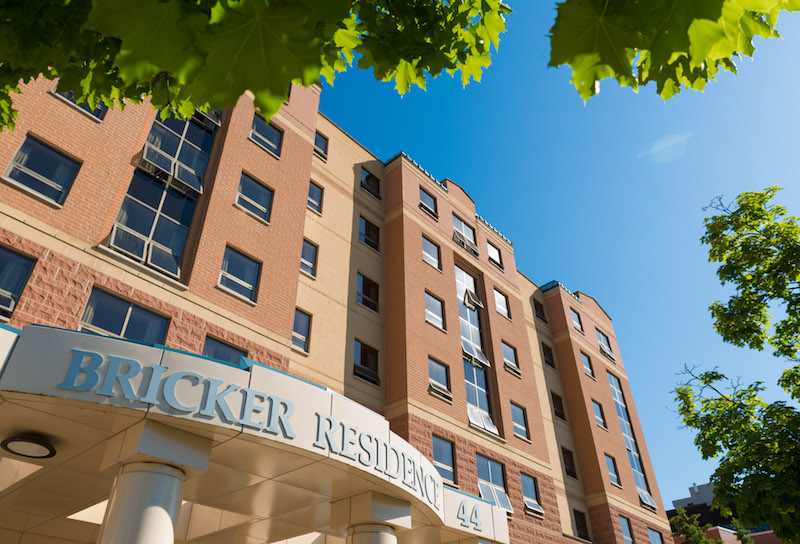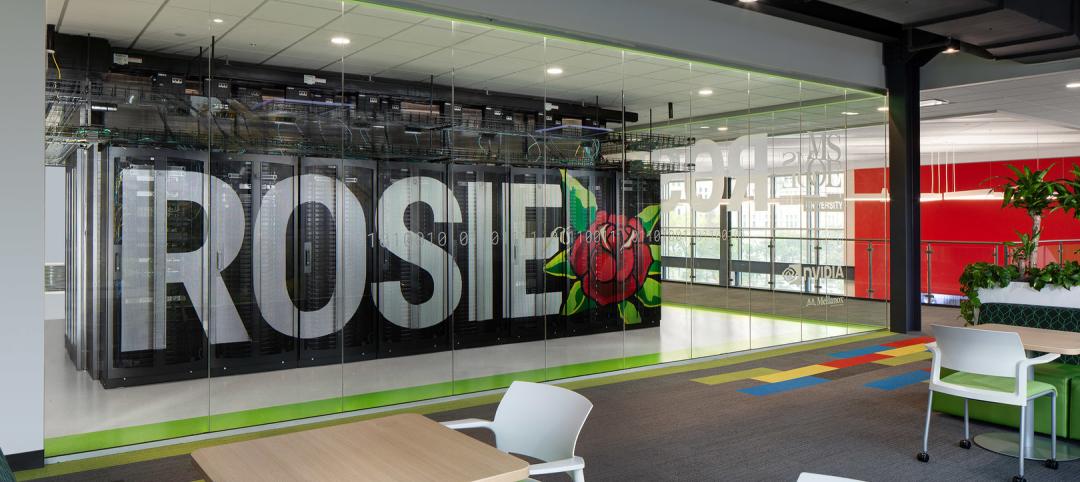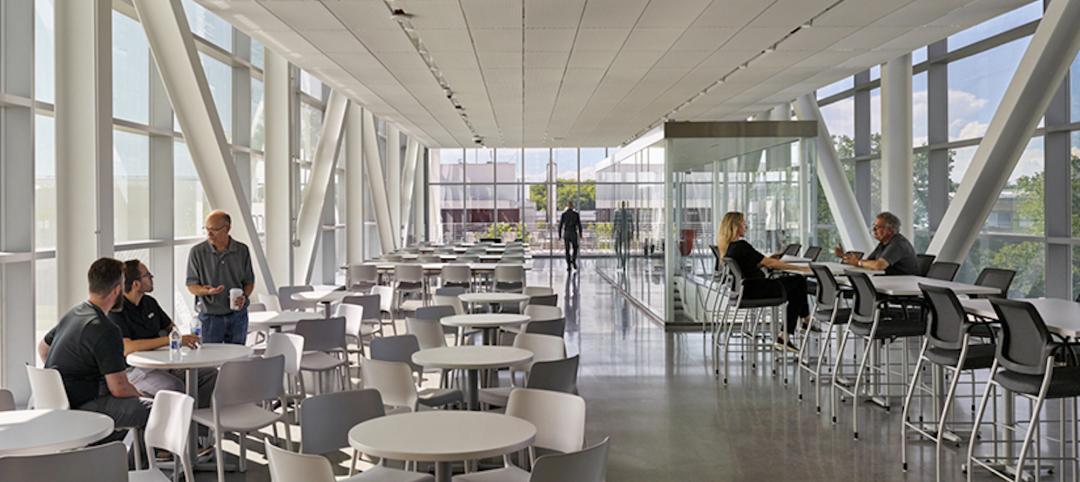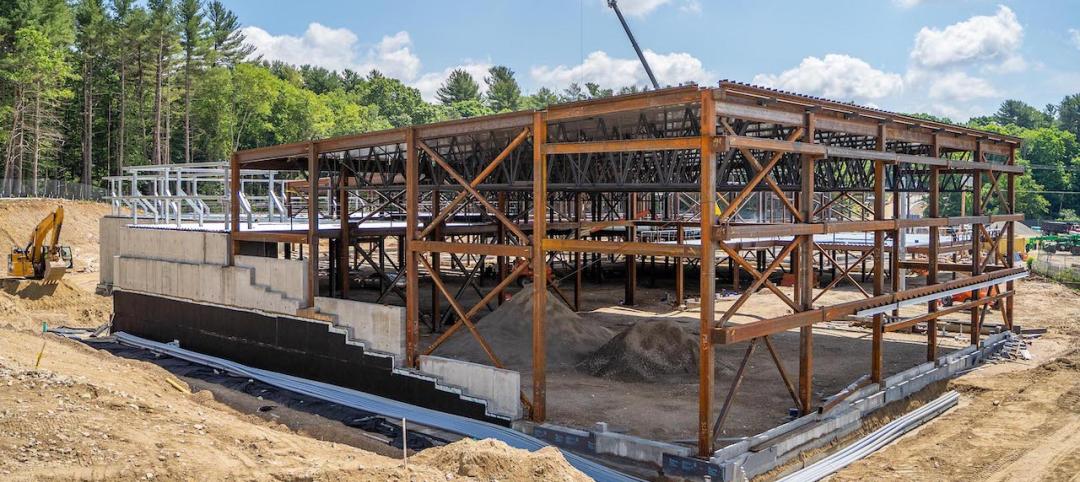Increases in energy costs are leading many building owners and facility managers to look for more cost-effective ways to heat and cool their buildings. Apartment buildings and student residences currently using electric systems are prime candidates for conversion to hydronic heating systems, and sometimes even water-based cooling systems.
Wilfred Laurier University, in Waterloo, Ont., opted to retrofit the electric heating systems in two of its existing student residences. The school went with hydronic heating and cooling for one of the buildings and hydronic heating for the other (which continues to use its existing forced-air DX cooling system).
The Bricker Residence, a nine-story apartment-style structure with four-bedroom suites that feature a common kitchen, bathroom and living room, required a retrofit that was designed to have fan coil units located in each of the suites, and a new piping system added to supply heating and cooling water in a two-pipe switch-over system.
The five-story Grand River Residence included classrooms and administrative offices on the first two floors with residence rooms on floors three through five. The project was designed to have hydronic reheat coils added to the existing VAV boxes already installed in the offices, classrooms and suites while the existing forced-air cooling system was kept intact. Due to the configuration of the building and the various locations of the VAV boxes, each floor had its own main loop that was fed with larger-diameter risers.
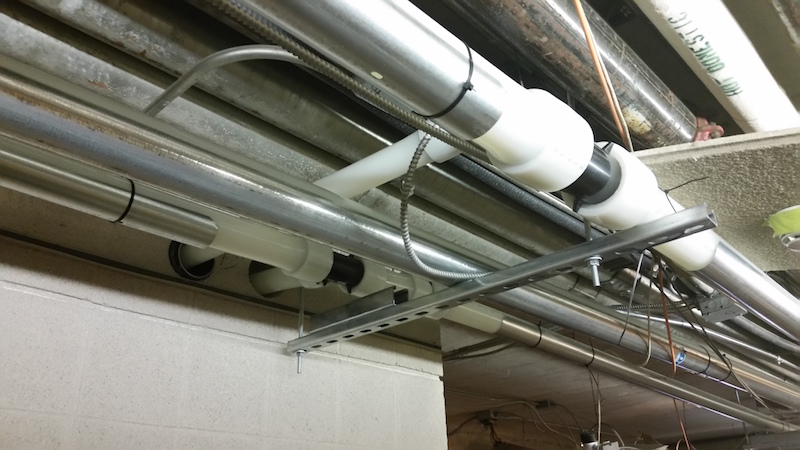
Tight timeframes and tight spaces
One of the key challenges was to have the installations completed when students were on summer break. Due to the tight timeline, and the fact that these were both existing finished buildings, mechanical contractor Modern Niagara opted to use PEX piping instead of a rigid pipe system. There were a number of areas where space was limited for the installation of pipe, so the flexible nature of Uponor PEX proved to be advantageous in those areas.
Uponor Design Services created the piping designs for each of the projects to ensure the pipe sizing and flow rates would meet with the engineer’s original design calculations and requirements. The project incorporated PEX sizes up to and including 3" diameter pipe with larger sizes being black iron.
For the Bricker Residence, Uponor PEX risers were installed between floors to connect to each of the fan coil units. The Grand River Residence utilized smaller-diameter Uponor PEX branched from the main loop on each floor to feed each of the reheat coils.
For both projects, the installers transitioned between black iron pipe and 3" PEX with brass threaded transitions and/or flange kits. Flange kits were also used for connecting the PEX pipe to some valves and circuit setters. Most of the horizontal PEX installations included Uponor PEX-a Pipe Support to allow for fewer hanging brackets and to help minimize pipe expansion.
Upon completion, the systems were filled and pressure tested, and the piping system was insulated before reinstalling the ceiling panels and sections of drywall. Thanks to the ingenuity of the system design and the efficiency of the installation crews, both projects were completed on schedule and the buildings were ready for the fall semester of incoming students.
Related Stories
Healthcare Facilities | Jan 31, 2023
How to solve humidity issues in hospitals and healthcare facilities
Humidity control is one of the top mechanical issues healthcare clients face. SSR's Lee Nordholm, PE, LEED AP, offers tips for handling humidity issues in hospitals and healthcare facilities.
HVAC | Dec 13, 2022
Energy Management Institute launches online tool to connect building owners with HVAC contractors
The National Energy Management Institute Inc. (NEMI) along with the Biden administration’s Better Air in Buildings website have rolled out a resource to help building owners and managers, school districts, and other officials find HVAC contractors.
75 Top Building Products | Nov 30, 2022
75 top building products for 2022
Each year, the Building Design+Construction editorial team evaluates the vast universe of new and updated products, materials, and systems for the U.S. building design and construction market. The best-of-the-best products make up our annual 75 Top Products report.
K-12 Schools | Nov 30, 2022
School districts are prioritizing federal funds for air filtration, HVAC upgrades
U.S. school districts are widely planning to use funds from last year’s American Rescue Plan (ARP) to upgrade or improve air filtration and heating/cooling systems, according to a report from the Center for Green Schools at the U.S. Green Building Council. The report, “School Facilities Funding in the Pandemic,” says air filtration and HVAC upgrades are the top facility improvement choice for the 5,004 school districts included in the analysis.
Data Centers | Nov 28, 2022
Data centers are a hot market—don't waste the heat!
SmithGroup's Brian Rener shares a few ways to integrate data centers in mixed-use sites, utilizing waste heat to optimize the energy demands of the buildings.
Engineers | Nov 10, 2022
U.S. engineering firms cash in on a volatile, expanding market
New practices and markets drive growth for U.S. engineering and engineering-architecture firms. And firms are getting serious about reducing projects’ carbon footprint.
Building Materials | Nov 2, 2022
Design for Freedom: Ending slavery and child labor in the global building materials sector
Sharon Prince, Founder and CEO of Grace Farms and Design for Freedom, discusses DFF's report on slavery and enforced child labor in building products and materials.
BAS and Security | Oct 19, 2022
The biggest cybersecurity threats in commercial real estate, and how to mitigate them
Coleman Wolf, Senior Security Systems Consultant with global engineering firm ESD, outlines the top-three cybersecurity threats to commercial and institutional building owners and property managers, and offers advice on how to deter and defend against hackers.
Multifamily Housing | Sep 15, 2022
Heat Pumps in Multifamily Projects
RMI's Lacey Tan gives the basics of heat pumps and how they can reduce energy costs and carbon emissions in apartment projects.
Building Materials | Aug 3, 2022
Shawmut CEO Les Hiscoe on coping with a shaky supply chain in construction
BD+C's John Caulfield interviews Les Hiscoe, CEO of Shawmut Design and Construction, about how his firm keeps projects on schedule and budget in the face of shortages, delays, and price volatility.


